Alumni Spotlight
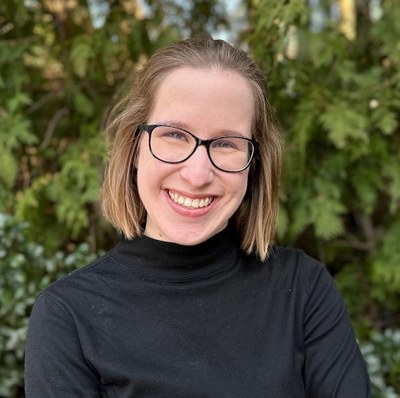
Libby Hagan
Please give us a brief overview of your undergraduate academic experience at UofL; how did you learn about the department of anthropology, and what was your journey like as an Anthro major? Suggestions for improvement are welcome.
I entered UofL as a biology major with intentions of attending medical school; however, my first semester left me feeling uninspired. After chance meetings with Drs. Peteet and Crespo, I enrolled in an anthropology class and soon discovered the discipline’s deep relationship to health and systems of care. I quickly changed my major and never looked back. Over the next three years, I worked with Dr. Haws at his field school in Portugal, assisted Dr. Beyin with an applied archaeology and lithics project, and participated in a comprehensive inventory of the university’s skeletal remains collection with Dr. Marklein. Additionally, I connected with students and faculty through my work as a teaching assistant, Peer Educator, and Peer Mentor.
Congratulations on earning your MA degree from Mercyhurst University this Spring; what aspects of learning strategies or habits-of-mind helped you succeed in your academic work?
While earning my MS in Forensic and Biological Anthropology from Mercyhurst University, Iutilized many strategies I learned from my professors. Dr. Storey always encouraged us to take whatever concept or term we had learned, and reframe it using our own words. This method of drawing connections between what you learn and what you comprehend has made it easier for me to understand and apply complex ideas throughout my coursework. Additionally, Dr. Marklein’s interactive and hands-on lab approach to learning osteology was similarly reflected in my graduate programs direct and tangible work with osseous materials.
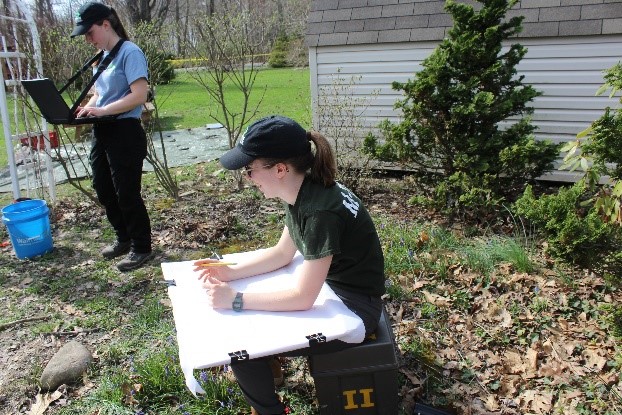
Libby in forensics field practicum during her MA training at Mercyhurst University
Tell us about memorable moments/events during your academic journey at UofL.
Some of the more memorable moments in my anthropology journey would have to be my time in the field. As a freshman, I was able to participate in a field school abroad, and it was there that I first found a passion for fieldwork. This desire to learn outside of the classroom only pushed me to be more involved in both archaeological excavations and laboratory analyses. Some of the most fulfilling work I accomplished at UofL was assisting Dr. Marklein and her students with the organization of cemetery records and inventory of skeletal remains.
Any advice to anthropology students?
The best advice I can offer my fellow anthropology students is to be curious. Be willing to explore different projects, courses, and opportunities. While I chose to specialize my graduate degree, my undergraduate career truly captured the holistic nature of the discipline with experiences in archaeology, osteology, cultural studies, education and leadership, etc. Anthropology will forever change how you see the world, and you’ll come to find that connections can be made between it and numerous other disciplines. Don’t be afraid to find those connections and use your passions to shape your experiences in anthropology.
Tell is about your next chapter- career move, location….e.t.c.
In this next chapter of my life, I’ll be even further from Kentucky than I was for graduate school. I’ve just moved to Orange (California) in July 2024, where I hope to apply what I’ve learned both as an undergraduate and graduate student to a career in archaeology, forensics, or museum studies. I am excited for what this next chapter holds, and I hope that one day, my work brings me back to the family I’ve made in the Department of Anthropology at UofL.
How can we contact you? It would be great if you can give us your social media handles.
I am always happy to talk more about my anthropology journey and share any education or career advice!
- Facebook - Libby Hagan
- Instagram - libbymaxwell99
- LinkedIn - Elizabeth Hagan
- Email: maxhagan99@gmail.com
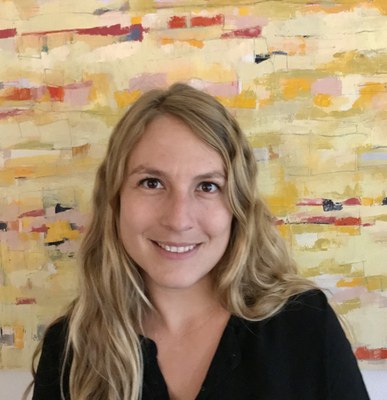
Grace Ellis
Please give us a brief career update- what have you accomplished after graduating from UofL; major milestones in terms of publications, research projects…etc?
I am currently a Doctoral Candidate in the Anthropology and Geography Department at Colorado State University. I specialize in landscape archaeology and remote sensing approaches to explore human-environment interactions in the past. My recent research focuses on modeling ancient maritime networks across the Caribbean to understand multicultural interactions before European contact. Over the past few years, I’ve helped co-organize the virtual Earth Archive Congress and was the recipient of the Winslow Series in Archaeology, which led to the publication of an edited volume, Infrastructure in Archaeological Discourse, that explores archaeological perspectives on material infrastructure. My work has also been published in Proceedings of the National Academy of Sciences, Latin American Antiquity, Journal of Quaternary Science, Quaternary Science Reviews, Quaternary International, and Remote Sensing Letters.
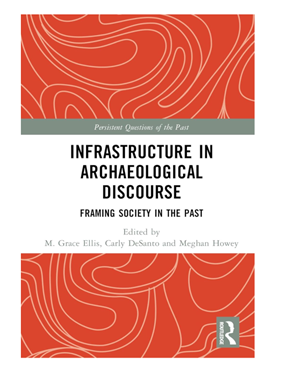
What aspects of your graduate training at UofL best prepared you to achieve your career goals?
UofL prepared me to be successful professionally in numerous ways. I received wonderful mentorship from Dr. Anna Browne Ribeiro and Dr. Jonathan Haws, who both continue to be supportive of my academic endeavors. The field experience I gained working in Portugal with Dr. Jonathan Haws and in Brazil with Dr. Anna Browne Ribeiro has been invaluable. I learned excavation and survey techniques and was able to explore and develop my interests in remote sensing and archaeology. These experiences fundamentally changed my theoretical perspective, expanded my methodological repertoire, and impacted the trajectory of my professional career, ultimately facilitating my current dissertation research.
Tell us about memorable moments/events of your life at UofL?
While it was no easy task, moving the archaeology lab was incredible. To prepare for the move, we had to unload and repack the entire collection, so we got to see and handle all the beautiful material culture of early inhabitants of the region – shell beads, atlatl weights, turtle shell rattlers, ceramics – it was amazing! The opening ceremony of CACHe was also very special. Another great memory is the Anthropology Graduate Student Association’s inaugural Beer with a Professor with Dr. John Hale at Four Pegs. Attendance was so packed I’m pretty sure the place almost ran out of beer! A few other memorable moments – all-nighters at the geospatial lab, long summers working in Portugal, conversations over coffee with my advisor, receiving the Anthropology Department’s Outstanding Graduate Award, and anchovy pizza!
Any advice to anthropology students at UofL?
Don’t be afraid to ask for opportunities, seek advice from mentors, apply for grants, or participate in research projects. Rejection and failure will undoubtedly follow, but you just might get the opportunity of a lifetime if you make the attempt. Just go for it!
How can we reach you?
Email: m.grace.ellis@colostate.edu
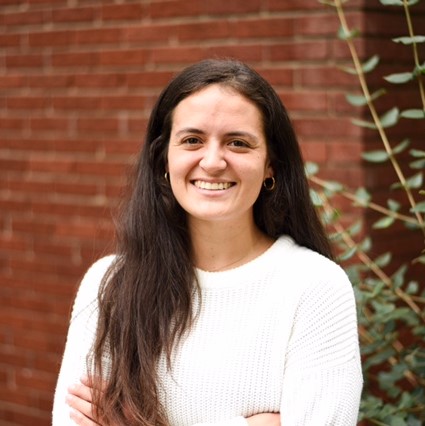
Isabel Abarca
Please give us a brief career update- what have you accomplished after graduating from UofL?
After graduating in May 2023, I had the luxury and joy of time to pursue many personal goals before starting a doctorate program in anthropology at the University of North Carolina Chapel Hill. I traveled to visit friends and family across the US, I had the opportunity to work with my hands in the dirt, and I moved states with my partner and cats.
What aspects of your graduate training at UofL best prepared you to achieve your career goals?
While many aspects of my graduate training at UofL have prepared me well for my current program, the process of writing and defending my master’s thesis has been central, both to being admitted to my current program and in the rich research experience that I have gained. Additionally, with my completed thesis I am able to use it to replace writing a required Fourth Semester Paper (FSP) and am currently working on a draft for publication from a section of my thesis.
Tell us about memorable moments/events of your life at UofL?
In general, having the opportunities to connect with community members and organizations through the support of Lisa Markowitz was something I really enjoyed and appreciated. I also thoroughly enjoyed working with an exceptional undergraduate anthropology student Bailey Wilson, through the Peer Mentoring program! I highly recommend participating in this program if you get the chance, for both undergraduate and graduate students.
Any advice to anthropology students at UofL?
Build meaningful connections! It’s always great to meet and make genuine connections with faculty (both in the department and beyond), graduate anthropology students (yes, even if you’re undergrad! This offers both students an opportunity for mentoring and collaboration), and, of course, undergraduate students! Strong community support and mentorship is essential to success in all areas of academia.
How is it like to pursue a PhD at UNC- opportunities and challenges?
The first semester was largely an adjustment period where I gave myself time to acclimate and make friends and build community. I faced some challenges that were expected (such as TA-ing and grading for 60+ undergraduate students) and others that were more surprising (institution specific obstacles) but have many opportunities to look forward to. As I start my second semester, I am excited to dive deeper into my dissertation topic and the surrounding literature, while also finding a better balance between work/school and life.
How can we reach you?
You can reach me at my new email, isaluz@unc.edu and I am happy to be a resource for students who are interested in PhD programs, graduate programs in general, or with any other support I can offer with regard to navigating academia, building community, and maintaining a healthy work/student/life balance.
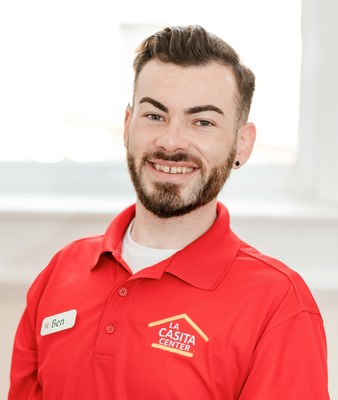
Ben Harlan
Please give us a brief career update- what have you accomplished after graduation from UofL?
I first had the opportunity to work with refugees from all over the world through the resettlement program at Catholic Charities of Louisville. Through this, I was able to host a panel on refugees and employment at the 2023 Kentucky Movement Assembly. Now I am the Housing and Energy Affordability Program Coordinator with the Metropolitan Housing Coalition, where I work with a host of community stakeholders to ensure rent and utility bills are affordable. I’m also helping manage a Metro Council (District 3) campaign. We look forward to Shameka Parrish-Wright taking office this November.
What aspects of your graduate training at UofL best prepared you to achieve your career goals?
So many faculty in the Anthropology department taught me to hone my writing and critical thinking skills, which has been invaluable to my career when it comes to finding solutions to high rent and utility bills. The expert feedback and guidance from all of my instructors, Dr. Markowitz, particularly, shifted my perspective to be more nuanced, critical, and data driven. Additionally, the relationships and networks I was able to form throughout my graduate career have proven critical to being an activist in our community. UofL is a powerful institution and allowed me to connect with many experts and leaders.
Tell us about memorable moments/events of your life at UofL?
One of the most memorable experiences at UofL was the opportunity to attend and present at the Community Engagement Symposium. Being able to learn from folks so deeply rooted in community engaged scholarship was (and still is) a privilege. We must have the praxis to support our theoretical assertions, and the scholars committed to community engagement helped shape my own understanding of the work I strive to do. Also, I would be remiss if I did not mention the lovely semester “grad gatherings” hosted by the Anthropology department. Having a beer with your mentors strengthens your relationships and provides the opportunity to speak casually.
Any advice to anthropology students at UofL?
Enjoy the experience and have fun. It can be so easy to be discouraged by heavy to-do lists, tight schedules, and general stress. However, at the end of the day, the experience is designed to promote dialogue, learning, and relationships. Four(ish) semesters pass so quickly. Be sure to have fun with your professors and peers and appreciate lively course discussions. At the end of the day, we are all here to enrich our minds and share ideas, and part of that will always be fun.
How is it like to work with MHC- opportunities and challenges?
Working with MHC has genuinely been a joy. I’ve had the chance to meet more people engaged in community activism spanning the spectrum–racial justice, sustainability, economic justice–you name it. We’re all working (generally) towards the same goals, just from different angles, and it has been a pleasure to connect with folks who have similar (but not identical) perspectives. I’ve also been able to really get “into the weeds” of local politics and policy, which has been both an opportunity and a challenge. Trying to align varied ideals to achieve a common goal over detailed policies can be messy and difficult.
How can we reach you?
I’d love to connect and talk about anthropology, social justice, community activism or anything else! Please send me an email. I can be reached at ben@metropolitanhousing.org or you can find me on LinkedIn using my first and last name.
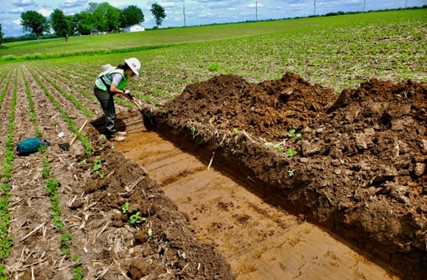
Ashley in the field- digging a strip trench.
Meet Alumna Ashley Lawhorn
Please give us a brief career update- what have you accomplished after graduation from UofL?
Upon graduating in the winter of 2021, I accepted a full-time job with Cultural Resource Analysts in Evansville, Indiana. My daily tasks include conducting archaeological survey and writing reports that aim to protect culturally significant resources across the state of Indiana and surrounding regions.
What aspects of your graduate training at UofL best prepared you to achieve your career goals?
All my classes at UofL prepared me for my career in one way or another! My lithic analysis class with Dr. Beyin gave me firsthand experience with fracture mechanics that I now utilize in the field on a regular basis when determining whether I’m looking at an artifact. Additionally, I’ve been able to transfer the skills I learned in Zooarchaeology with Dr. Haws when I come across random animal bones on survey! And of course, in my Kentucky Archaeology class with Dr. Smallwood, I was able to learn regional history that still applies to the areas I work in today.
Tell us about memorable moments/events of your life at UofL?
Much of my time spent in Louisville was amid the early days of the pandemic, so any human contact during that time was memorable! I was lucky enough to be a student-athlete for my first year of grad school and the track and field team helped me get adjusted during that time. As far as classes went, it was always a treat to be able to make it to in-person meetings, especially those held in the CACHE center.
Any advice to anthropology students at UofL?
My main bit of advice to current students in anthropology is not to limit yourself by getting bogged down to one subfield. The great thing about this degree is that it’s so versatile. Try and use the four-fields approach to the best of your advantage. Explore any of the classes that interest you—even the ones that might fall out of the realm you’re focusing on!
How is it like to work with CRM firms- opportunities and challenges? How can we contact you?
Working in Cultural Resource Management is something I knew I wanted to do before starting grad school. I find a lot of enjoyment in this job and part of it has to do with how challenging it can be. Working in the Midwest/Southeast means digging shovel tests in freezing cold or walking transects in the middle of summer. If you enjoy being outside, traveling, and you don’t want a typical 9-5 desk job, I highly suggest looking into this career. Also, it never gets old telling people that you’re an archaeologist! If you’re interested in CRM and you’d like to contact me with general questions or about job opportunities, you can email me at: aklawhorn@crai-ky.com
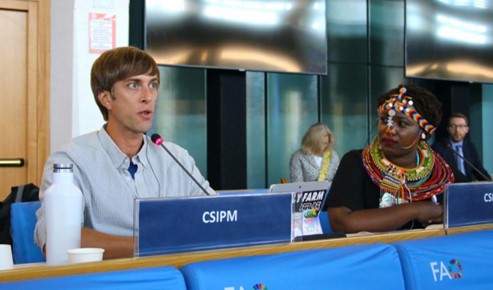
Tyler representing the Civil Society and Indigenous Peoples’ Mechanism (CSIPM) at a FAO sponsored meeting.
Meet Alumni Tyler Short
Please give us a brief career update- what have you accomplished after graduation from UofL?
I’m pleased to report that I’m happy and healthy, enjoying a diverse and nutritious harvest from the family farm in Henry County where I started working once the pandemic began.
I continue studying anthropology, philosophy, and history. I’m nearing Spanish fluency, achieved mostly through immersive travel in Latin America and the Caribbean. I am also now the President of La Minga Farm, which was the focus of my M.A. thesis. In recent years, I had joined the Board of Directors for Family Farm Defenders, and through FFD, I’ve become integrated into the international peasant movement La Via Campesina
I dedicate a lot of my so-called free time to representing La Via Campesina as a youth coordinator in the Civil Society and Indigenous Peoples’ Mechanism, an essential and autonomous part of the United Nations Committee on World Food Security.
What aspects of your graduate training at UofL best prepared you for your current work?
Graduate training greatly strengthened my reading, writing, and presentation skills which are highly useful in my work related to grassroots organizing and human rights advocacy, primarily for facilitation, communications, political education, and policy negotiations.
Ethnographic research methods have proven foundational to my current work as well, particularly concerning my ability to conduct participant observation fieldwork involving semi-structured interviews and other forms of qualitative data collection.
Above all, my M.A. program sharpened my critical thinking skills. Training in social theory and history was crucial for learning how to analyze root causes of social problems.
Tell us about memorable moments/events of your life at UofL?
I have many good memories of socializing with classmates outside of Lutz Hall and in the anthropology department’s student computer lab. I was fortunate to make several friends. In many ways, mentorships with Dr. Markowitz and Dr. Parkhurst accelerated my academic and professional development. I have good memories from their courses as well as from regular visits to their offices to discuss the progress of my Master’s thesis project.
Jeneen Wiche, a lecturer in the department, was also such a positive influence. Her course on Food and Body Politics very much inspired me to seriously consider agriculture both as a way of life for a young activist and as a field of study for graduate research.
Any advice to anthropology students at UofL?
If you have specific careers in mind, search for relevant job postings online while you’re still a student, and determine what knowledge and skills you need to acquire to be qualified for those positions. Try to learn new skills and ways of thinking, rather than seeking to perfect your existing ones.
Join a community-based organization. Mutual aid and other forms of collective action can lead to numerous opportunities for personal growth and genuine social change.
Balance is central to well-being. While focusing on school, always take care of yourself. Eat well, exercise, spend time with your loved ones, and make sure to do your homework!
How is it working with diverse grassroot groups from local to international scenes? How can we contact you?
I have experienced a deep sense of fulfillment and countless educational moments made possible by farming and involving myself in food sovereignty movement-building processes from the local to global levels.
At the local level, I really enjoy growing my own food, working on a family farm, and participating in grassroots organizations that promote community-based agriculture. We’re also striving to increase land access and establish a food policy council in Louisville.
At the global level, much of my work over the past two years has revolved around coordinating youth participation in a policy process of the UN Committee on World Food Security. This was very enlightening but also quite challenging because Member States rejected nearly all of our proposals and demands when we negotiated the text of the policy recommendations intended to support of youth engagement and employment in agriculture and food systems. The struggle for human rights and social justice continues!
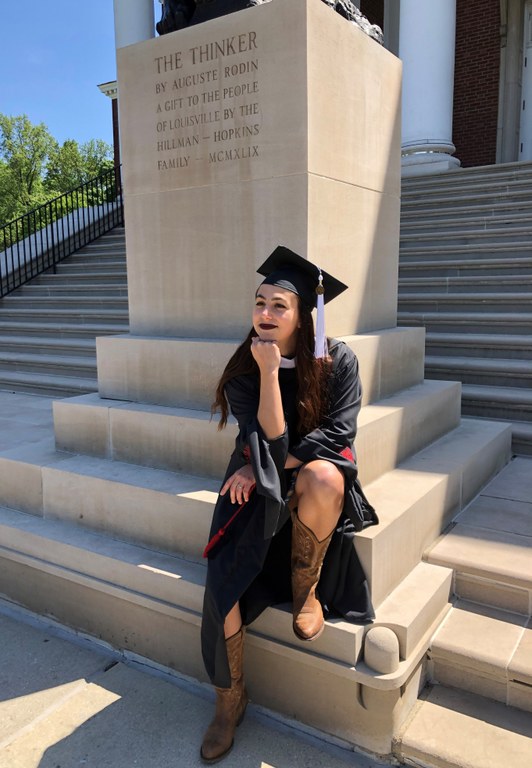
Zoe Doubles
Meet Zoe Doubles: 2021 MA graduate, currently pursuing a PhD in anthropology at the University of Illinois Urbana-Champaign
Please give us a brief career update- what have you accomplished after graduation from UofL?
After graduating from UofL with an MA degree in Anthropology in 2021, I was accepted with full funding to the University of Illinois Urbana-Champaign where I am a second year PhD student in the anthropology department. I have continued to work at the Center for American Archeology on the site of my Master Thesis project. In the coming summers, I will be working on sites in southwestern Virginia, looking at the adoption and influence of the Mississippian frontier on Virginia’s Late Woodland groups!
What aspects of your graduate training at UofL best prepared you to achieve your career goals?
My graduate training from UofL allowed me to already have experience within a graduate program which helped me hit-the-ground-running in my PhD program. The experiences of writing large papers, the workload for classes, and the ability to run and create my master thesis project has benefited me as I am navigating my dissertation project. I have the confidence and skills to achieve what I want to do with my research.
Tell us about memorable moments/events of your life at UofL?
I really enjoyed my cohort at UofL. It was so much fun organizing our Archaeology Day events on the lawn outside of the Anthropology Department. It was also wonderful getting out in the field with my cohort and Dr. Jennings and Dr. Smallwood and conducting survey and STPs with everyone, rain, or shine.
Any advice to anthropology students at UofL?
My advice to anthropology students at UofL would be this: don’t be afraid of changing your region of focus to follow your interests or your moral compass. I started out my undergraduate career wanting to do Classical archaeology and now I am working in North America and have changed my region of focus three times. This is a little daunting with the amount of background reading that is needed but is so much fun! It is also allowing me to pursue more collaborative work with Indigenous communities, which is something I am very passionate about!
How is Urbana-Champagne treating you- academically and socially? How can we contact you?
Urbana-Champaign has been wonderful to me. I am taking several courses in the Indigenous Studies department that is giving me the resources and exposure to the inner workings of NAGPRA and collaborative research that I want to pursue. I have also formed strong bonds with my cohort, which is something that I love and appreciate. I also have pursued positions within the student union on campus which has gotten me more active on campus outside of my department! The best way to contact me is via email at doubles2@illinois.edu.

Ashley Ezzo
We are delighted to announce that Ashley Ezzo, (M.A. August, 2021) has received the Alice Eaves Barnes Award, the University-wide recognition for a master’s student who has displayed tenacity in the face of adversity, while attaining excellence in both the classroom and outside endeavors. Here is what Ashley had to say about her Anthropology studies:
I graduated with a double major B.A. in Anthropology and Comparative Humanities with two minors (Psychology and Archaeology) from Eastern Kentucky University in 2018. The following year, at the meetings of the American Association of Physical Anthropologists (now the American Association of Biological Anthropologists), I met Dr. Crespo and Dr. Marklein. Shortly after, I was warmly introduced to Dr Markowitz and the rest of the Anthropology department. After meeting the department, I felt the UofL M.A. program was the right fit for me.
Despite the COVID-19 pandemic, I graduated with my M.A. in two years with concentrations in bioarchaeology and biomedical research. My M.A. thesis, precepted by Dr. Marklein, examines the demographic distributions and paleopathological profiles of juvenile skeletal remains from high SES (St. Bride’s Crypt and Chelsea Old Church) and low SES (St. Bride’s Lower and Crossbones) Postmedieval (1700-1850 CE) London cemeteries. During the Postmedieval period, children, especially of low socioeconomic status (SES), participated in the workforce and therefore, faced large amounts of stress during their short lives. While results indicated higher mortality in low SES, a risk associated with low SES circumstances, most differences in pathological conditions did not reflect a similar divide. Rather, paleopathological distributions showed greater differences by individual cemetery than between SES samples, suggesting more variation within ascribed SES groups.
Currently, I am a research technician for the Kentucky Spinal Cord Injury Research Center with an intent to improve the quality of life of those in the Spinal Cord Injury community.
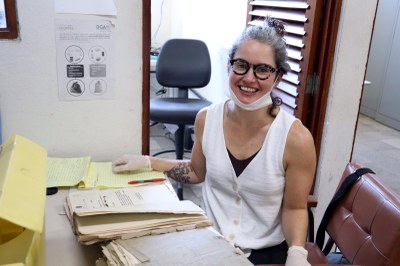
Shelly Biesel
Please give us a brief career update- what have you been doing since completing your MA?
I have been completing my PhD in ecological anthropology at the University of Georgia. Last year I received a Fulbright-Hays to do research in Pernambuco, Brazil’s Zona da Mata, where I partner with Christine Dabat at the Universidade Federal de Pernambuco. Although Covid-19 forced me to return early from fieldwork, I am still virtually undertaking my dissertation project with help from community partners in Brazil.
What aspects of your graduate training at UofL best prepared you to achieve your professional goals?
I definitely benefitted most from the kind, patient, and attentive mentorship I received from not one, but multiple faculty in the Anthropology Department. As a first-generation college-student, I felt like I really needed that sort of close attention and guidance. As I have treaded further into my PhD program at UGA, I have also realized how much I continue to benefit from the theoretical and writing training I received while completing my MA at UofL.
Tell us about memorable moments/events of your time in the MA Program?
One of my favorite memories was touring the refugee community gardens in Lisa Markowitz’s Anthropologies of Food course! And of course, late nights writing my dissertation in the library coffee shop was a quintessential pastime.
Any advice to current MA candidates?
While you may think you are under-experienced, go do fieldwork for your MA project. I learned so much from the months I spent in Appalachia, Kentucky. And professionally speaking, that project facilitated my first peer-reviewed academic publication when I eventually got to my PhD program! It does not have to be anything too fancy or extensive, but you will learn a lot from conducting interviews and managing a project of your very own.
Also, if you plan on being an anthropologist, do not short change the theory readings. They may seem daunting in the moment, but they will help you tremendously later on.
Pdf: "Research in Economic Anthropology" (2021)
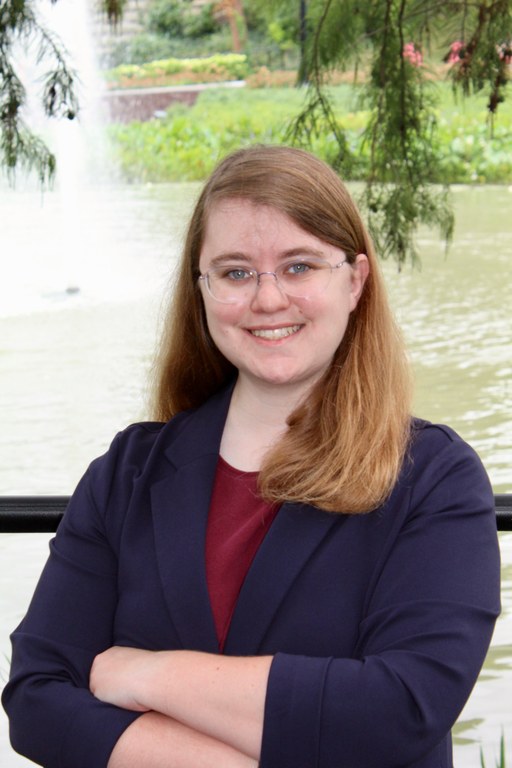
Meet Megan Duncanson—UofL Graduate, Class of 2019!
Since completing her MA at UofL, Megan has had the opportunity to travel around the country before starting a PhD program in Anthropology (Bioarchaeology) at the Ohio State University. Below she reflects on her time in the Department of Anthropology at UofL.
How graduate training at UofL prepared Megan to achieve her professional goals
In general, the same toolkit that was helpful to me moving through the M.A. program has been helpful for my continued study at the next level: time management, organization, and attention to detail. All skills that I developed while completing coursework and research for my M.A. and which I continue to hone.
Megan describes memorable moments/events during her time in our MA Program
Memorable events include the Beer with a Professor series I helped organize through the graduate student association. Attending talks from visiting professors in Ekstrom Library was always a treat. What sticks out to me after my time in the department (for both undergrad and graduate degrees) is not so much any specific event, but the memories of having a department where I could do work, spend time with my cohort and peers, the conversations had, and the comraderies developed both in and out of classroom.
Megan’s advice to current MA candidates and prospective students
Stay as involved as possible with both the graduate student association for the department, as well as organizations outside the program. Take advantage of the myriad of lectures, workshops, and other opportunities that are offered to you by both the department as well as the university. Be sure to attend conferences and broaden your perspective as much as you can. Even if your research interest is narrow, other perspectives can provide insight!
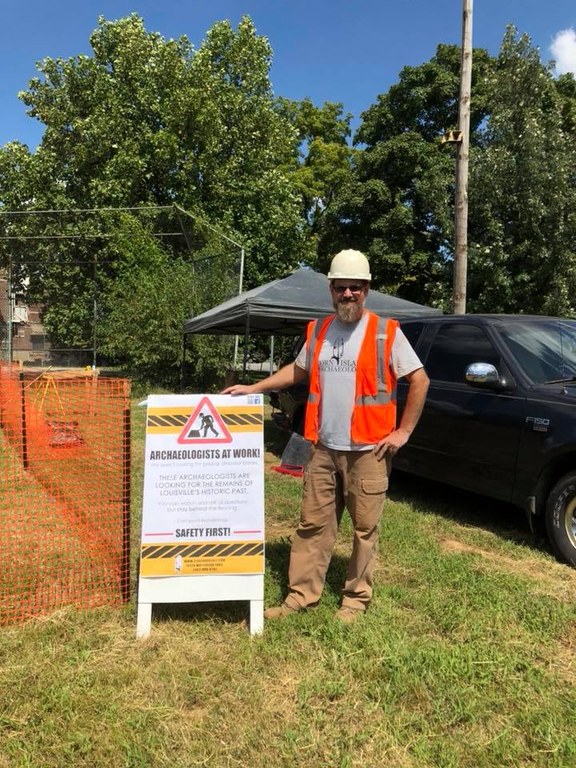
David Schatz
Please give us a brief career update- what have you accomplished after graduation and what are you doing now?
Since graduating I have continued to work in the archaeological field much as I have for the last 29 years. The major change has been the size and scope of the projects that I have been fortunate to take on including several Phase II and III urban projects. These projects all required extensive research and writing in addition to months of fieldwork to accomplish. I am currently working on the Beecher Terrace redevelopment project where I am co-PI. This project will ultimately excavate 21 house lots in the Beecher Terrace area at the eastern end of the Russell neighborhood here in Louisville.
How has your Anthropological training at UofL helped you achieve your career goals?
The training and coursework during my time in the UofL graduate program provided me with a whole new vista on analysis and interpretation of the material culture that is recovered in the field. Grad school also greatly improved my writing which is important when communicating the findings from an archaeological site. Another important aspect of my experience was learning GIS something that has become integral to almost all projects that I run these days.
Tell us about memorable moments/events of your graduate life at UofL?
My most memorable experience was probably my first week of grad school, where I began to wonder if I had bitten off more that I could chew. When I started in the grad program, I hadn’t taken any college classes in 15 years, was a father of three, and worked a fulltime job. My first two courses were theory classes with Dr. Parkhurst and Dr. Peteet and…well let’s just say that I thought I was a decent writer, but it was a real challenge to make the transition from technical to academic writing!
Any advice to fellow Anthropology students at UofL?
For undergrads: Go to class. Read. Interact with both your professors and grad students. For grad students? Again, keep up with your reading. If you are taking a seminar class, be proactive in the discussion even if you are a little lost. Interact with the material you are learning as much as possible. I can’t recommend GIS classes enough. They provide the basis for data analysis that is extremely useful in all anthropological fields. Have fun! You are embarking on a very intellectually rewarding career. It’s great to get paid for something you love!
How can we contact you?
The best way to contact me is at dschatz@ciarch.com at Corn Island Archaeology here in Louisville where I am a Senior Archaeologist and Principal Investigator. I have, for a number of years, guest lectured for David Hoefer talking about what to expect in cultural resource management careers in archaeology, so I still enjoy interacting with fellow students if they need advice or career opportunities. I’m usually busy so it may take a few days to get back to you. I might even have work if you’re interested!
I also invite readers to check out a couple of recent stories about the work my colleagues and I do at Corn Island Archaeology:
https://wfpl.org/here-today-diggin-on-beecher-terrace/
https://www.facebook.com/watch/?v=2318612668424907
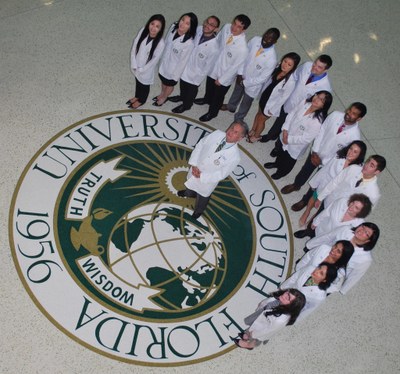
Johanna Yun, MD
Graduated from our program in 2014. Did Fulbright in S. Korea in 2015, now MD.
Please give us a brief career update- what have you accomplished after graduation from UofL?
This May, I am graduating from the University of South Florida Morsani College of Medicine to start a four-year residency in neurology at Emory University. Prior to medical school, I taught English as a high school teacher in Seocheon, South Korea, through the Fulbright English Teaching Assistantship.
How has your Anthropological training at UofL helped you achieve your career goals?
My anthropological training at UofL built me a foundation to analyze why people do the things that they do and to strive to be more culturally aware. It has taught me that much of our daily practice and the problems that we face are rooted deeply in our history. In the medical field, it is vital to know a person's history, who they are, and what they value. If I know more about the person as a whole, I can then identify how to treat the person, staying aligned with his or her quality of life and values.
Tell us about memorable moments/events of your life at UofL?
I absolutely loved my time at UofL! One of my most memorable moments was going on a trip to Greece for the Archaeology of Ancient Greece Honors seminar with Dr. Hale. It was so much fun to learn about ancient mythology, historical religious practices, and architecture as we stood in the place of where it all happened! Through the Brown Fellows Program, I also traveled to Nepal for a social research internship. I lived in a village homestay in Sarangkot, and saw Mount Everest while I was there! On campus, I really enjoyed my course in medical anthropology with Dr. Tillquist. A lot of our discussion has become relevant to my personal journey in medicine and has made me think about the complexity of diagnosing mental illness. I also loved having late-night conversations with friends, who would turn out to be my closest friends after 9 years!
Any advice to fellow Anthropology students at UofL?
Be respectful to everyone you meet. Kindness and politeness are never out of style.
Self-awareness is the start of self-improvement. Knowing yourself will lead you to where you want to go.
Be intentional about what you do. Do activities that you genuinely would enjoy and learn from people who inspire you.
Don’t beat yourself up for circumstances you cannot change. Change the ones you can.
Don’t be afraid to be vulnerable. Share your challenges with others and find strength in numbers.
How is life as an MD candidate? How can we contact you?
It’s a very humbling experience. You will never know everything in medicine. But you are expected to know a lot and it can be overwhelming at times. It's easy to lose confidence in yourself and have self-doubt. But, through it all, you learn how to stay resilient, take care of yourself, and build up yourself and others. Through the clinical rotations, you learn so much from your patients. I’ve had many deep and intimate conversations with people that I otherwise would not have had the opportunity to have. Having that kind of insight into the human experience is truly a privilege.
Please feel free to reach me at my email, johannay22@gmail.com.
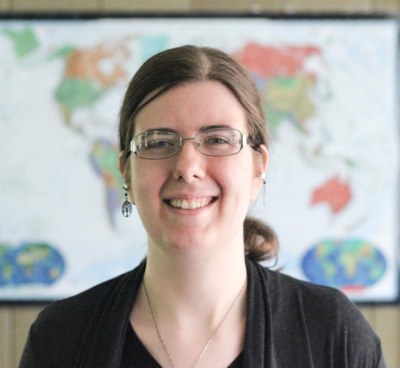
Irene Yates
Please give us a brief career update- what have you accomplished after graduation?
Before graduation I applied to and was accepted into the JET Program, a Japanese government program that recruits native English speakers to work as assistant language teachers in Japanese schools. Immediately after graduating, I moved to a suburb of Tokyo where I now teach English at a public high school.
How has your Anthropological training at UofL helped you achieve your career goals?
At UofL, I learned skills that have enabled me to adapt to my work environment. My current career path is a bit unconventional, as my focus of study, with the guidance of Dr. Julie Peteet, was forced migration and Muslim charity. However, my fieldwork training taught me effective observation and to question my assumptions, skills that I use every day in the classroom and office. I also had the good fortune of working as a graduate teaching assistant with Dr. Angela Storey, who helped me to become more confident in presenting ideas in a classroom setting. Currently, one of my responsibilities is to introduce diverse perspectives to students and encourage them to think critically, learning objectives that mirror introductory anthropology courses.
Tell us about memorable moments/events of your graduate life at UofL?
Most of the most memorable moments of my graduate life at UofL happened outside of the classroom – intense theory discussions and light department gossip in the computer room or at AGSA meetings, visits from dogs during the rush to grade final exams, chatting about the future of refugees in Kentucky over a generous plate of Bosnian chevapi. These small things made my graduate experience special.
Any advice to fellow Anthropology students at UofL?
Graduate school is a great time to network and learn outside of class. It’s difficult because of how busy school and family and work can keep you, but try to make time to use university resources while you have access to them. Go to special lectures. Attend AGSA meetings. If you read an interesting article, e-mail the author. Submit conference abstracts. Just because it doesn’t get you a grade doesn’t mean it’s a waste of time! That includes making time for resting and taking care of yourself.
How is Japan treating you, and how can we contact you?
West Tokyo is great. You can be in downtown Tokyo in an hour by train in one direction or out in the mountains in a tiny village in an hour in the other direction. The best thing about the winter is that you can often see the top of Mt. Fuji from the train station! My husband and I are still enjoying spending weekends wandering around different neighborhoods. Japanese is hard, but we’re doing our best to learn at the local community center. We meet a lot of other migrant workers there, too.
People can contact me on this e-mail: irenelevyyates@gmail.com.
